New app helps better skin cancer diagnosis

A new app has been developed to help doctors to diagnose malignant and benign skin lesion and skin growths at an earlier stage.
The app – named Dermofit –has now been licensed to Simedics, a company based in Yorkshire in the UK, which specialises in digital products and publishing for the healthcare and public sector services.
The app could ultimately help improve outcomes in skin cancer: cases of the most serious skin cancer, malignant melanoma, increasing rapidly in recent decades. This huge increase in case is largely attributed to greater exposure to sun and sunbeds.
Dermofit is the brainchild of Professor Jonathan Rees, Grant Chair of Dermatology at the University of Edinburgh who had the initial concept to develop a digital tool to educate GPs in order to improve skin lesion diagnosis proficiency back in 2005.
Professor Rees has now collaborated with Professor Bob Fisher of the University's School of Informatics to further develop the Dermofit app.
Professor Rees comments: "Thirty per cent of doctors will automatically send a patient to a hospital if they have signs of a skin growth. But the evidence is that the vast majority of people who are seen and referred do not have skin cancer or anything serious at all."
Bob Fisher, who specialises in computer vision and helped design the computer algorithms for the app, adds: "Dermofit contains a photo library of skin lesions to help inform practitioners to diagnosis more effectively. Practitioners can click on the image of a lesion of interest which then leads to further similar lesions.
"As lesions are selected, further sets of similar lesions are displayed. This gives familiarity with the different skin lesion types and allows users to differentiate between lesions that look similar, but that are from different skin lesion classes."
The app took around four years to develop, which included sourcing the extensive image library and associated diagnoses (which currently boasts over 1,300 images), developing the algorithms to automatically group the photos based on their colour and texture properties, and testing the product with real-life practitioners.
Simedics originally approached the University of Edinburgh regarding the technology through 'University Technology' an initiative that promotes new technology opportunities for industry from all of Scotland's universities.
The app was licensed to Simedics this summer, through Edinburgh Research and Innovation (ERI), the University of Edinburgh's commercialisation arm. The company now plans to develop and launch a commercial product this autumn, targeted at the medical students, dermatology specialist nurses, and general practitioners training market.











